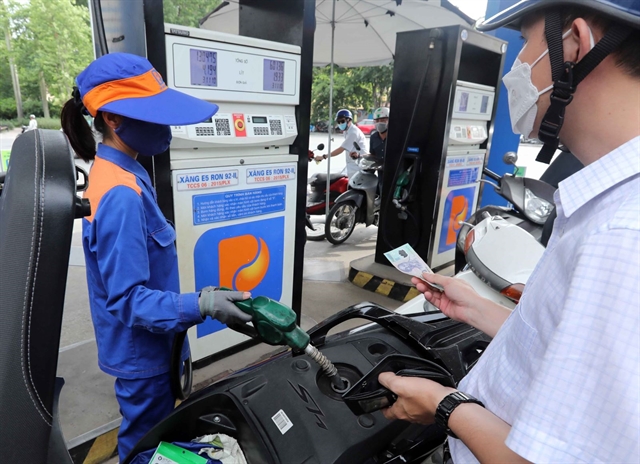 Economy
Economy

 |
| Petrol prices were forecast to continue to increase towards the end of the year due to moves to tighten the supply by major world producers. — VNA/VNS Photo Trần Việt |
HÀ NỘI — The Ministry of Industry and Trade believes that the appropriate use of the stabilisation fund would be important to restrain increases in petroleum prices and reduce the impacts of these increases on the country’s socio-economic development.
From the beginning of this year, petrol prices have been raised 16 times with a total increase of VNĐ3,500 per litre. The latest increase was on September 21, which brought the petrol price to nearly VNĐ26,000 per litre.
Petrol prices are forecast to continue to increase towards the end of the year due to moves by major world producers to tighten supply.
According to the Mercantile Exchange of Việt Nam (MXV), Russia, the world's third-largest oil producer with a market share of 13 per cent globally, after the US' 16 per cent and Saudi Arabia's 13.5 per cent, has put a squeeze on the oil market with a diesel export ban, threatening to aggravate a global shortage.
Countries that imported fuel from Russia have been forced to look for supplies from other markets, and oil refineries around the world need to increase capacity to meet demand.
Phạm Quang Anh, director of MXV’s Information Centre, said that the move to tighten oil exports would increase petroleum prices in the last four months of this year. Brent oil prices are forecast to increase to $90-95 per barrel, while the price range of $100 per barrel would largely depend on the economic situation, especially the growth of the US and Chinese economies.
The continued increase in fuel prices might heavily weigh on the consumer price index (CPI), Anh said, adding that it was important to seek measures to stabilise petroleum prices.
The Ministry of Industry and Trade said that domestic petroleum prices had increased continuously due to fluctuations in the global oil market and the world economy over concerns about moves to tighten supplies by major producers.
According to a joint decision of the Ministry of Industry and Trade and the Ministry of Finance, in the recent adjustments of petroleum prices on September 21, VNĐ300 was used from the petrol price stabilisation fund for each litre of petrol, diesel oil, and kerosene, a very modest level compared to the fund’s balance of more than VNĐ7.4 trillion.
Regarding the use of the stabilisation fund, the Ministry of Industry and Trade said that the use of the fund was implemented in accordance with the finance ministry’s circular 103/TT-BTC, which states that the fund is used when the increases in petrol prices are from 7 per cent.
Seven recent increases in petrol prices were all below 7 per cent, meaning that the fund had not been used in these adjustments, the ministry stated.
Expert Nguyễn Tiến Thoả said that it was necessary to amend regulations about the use of the petrol price stabilisation fund to ensure it works to stabilise petrol prices.
Expert Vũ Vinh Phú said that the existing taxes and fees on petrol remained at high levels, an important factor pushing up domestic retail petrol prices.
Reducing taxes and fees related to petrol imports could help lower petrol prices, Phú stated.
Việt Nam also needed to build a transparent oil and petrol market in line with regional and global markets, which would help better harmonise benefits between the State, enterprises, and residents, he stated.
The Ministry of Industry and Trade said that in order to restrain increases in petrol prices, the ministry proposed solutions to the Prime Minister, including the efficient use of the stabilisation fund.
A representative from the Ministry of Finance’s Price Management Department said that petrol was among essential goods and its price increase would significantly affect prices of other goods and services.
The Ministry of Finance would enhance cooperation with other ministries, agencies, and localities to tighten price management, to prevent unreasonable increases in prices, and to strictly handle speculation. — VNS




